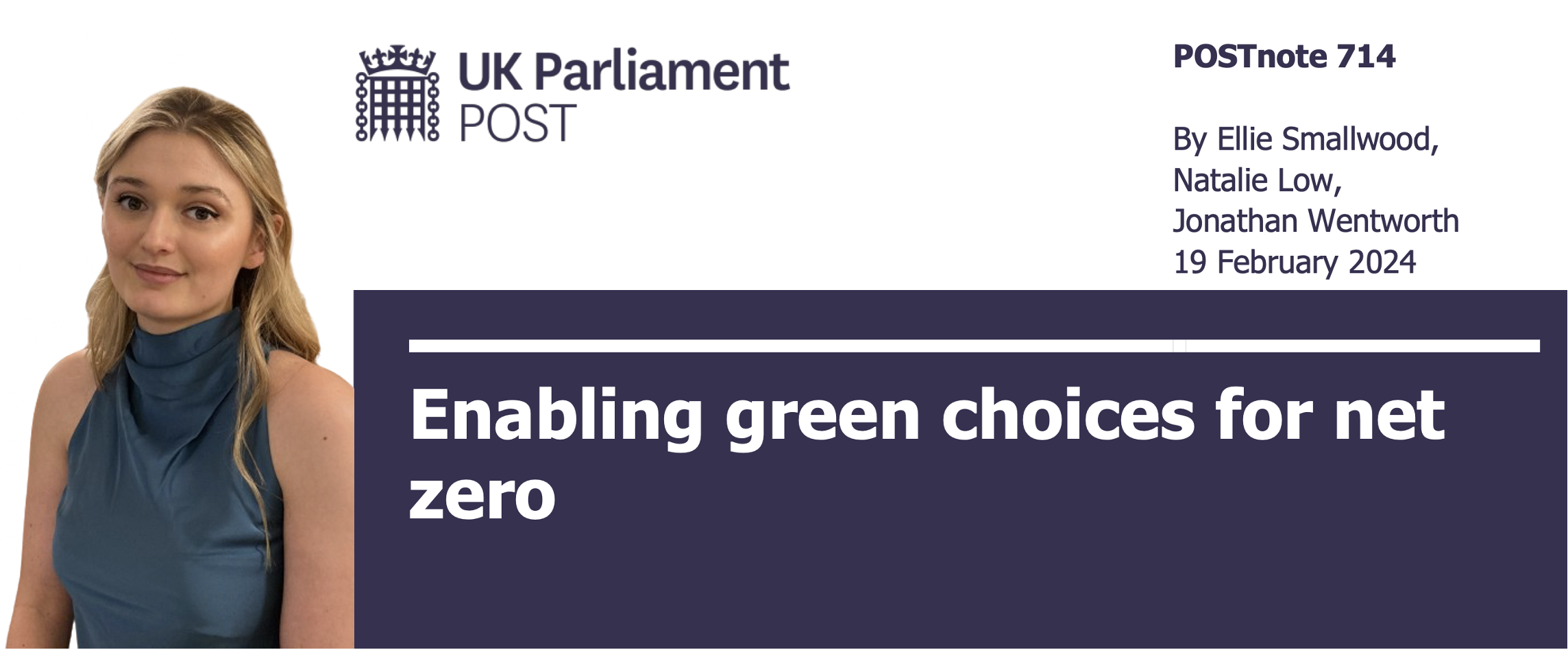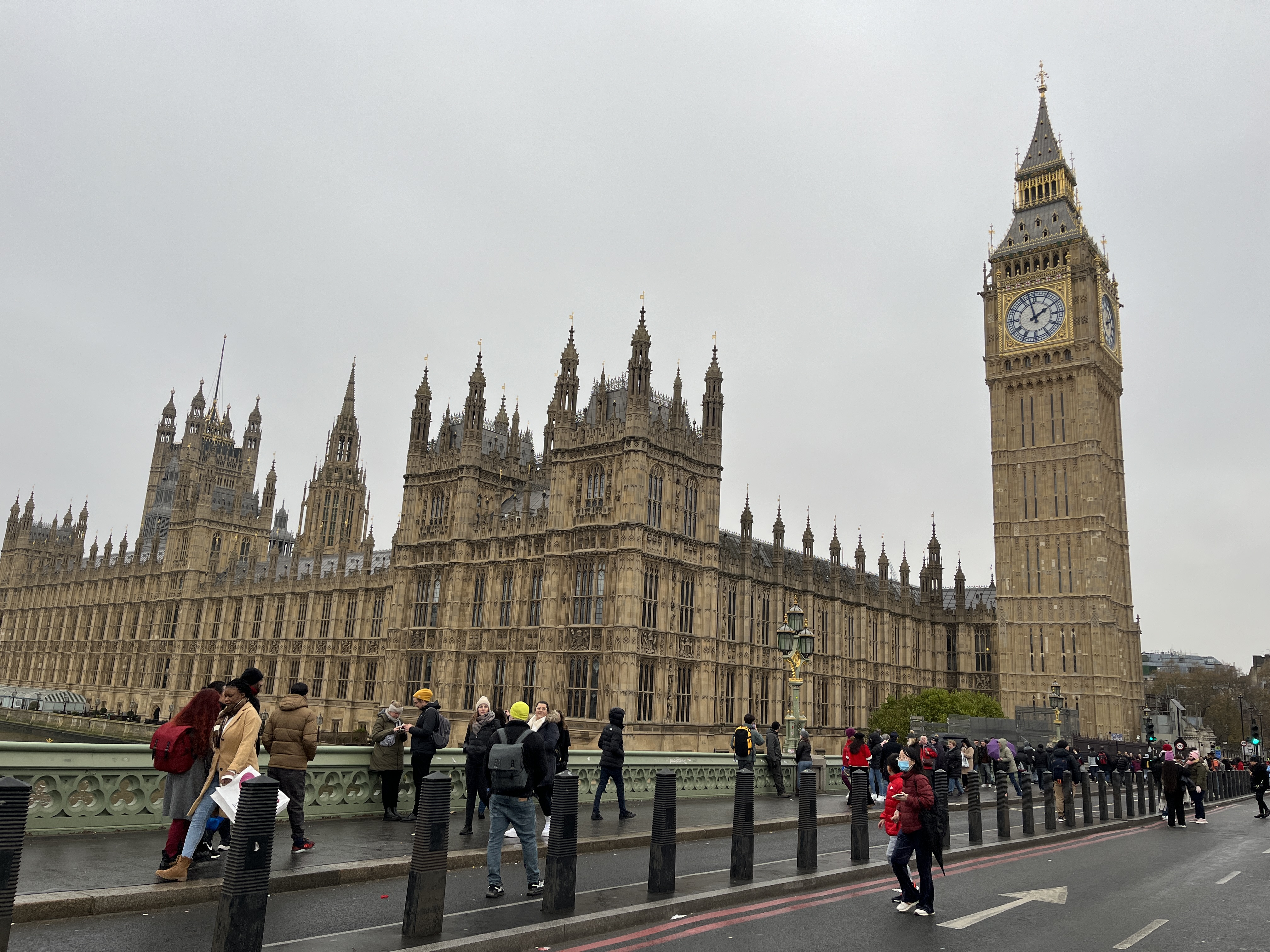August 09 2024
At the end of 2023 I undertook an internship at the Parliamentary Office for Science and Technology (POST), under the UKRI Policy Internships Scheme. POST is a research and knowledge exchange service based in the UK Parliament, predominantly producing POSTnotes or POSTbriefs to inform legislative processes and Government decisions. The key element of POST that made me so keen to be involved was that they ensure all research they publish is impartial, non-partisan, timely and peer-reviewed; all of which are highly valuable in academic research, but also crucial for political discussions. In this blog I present my honest reflections on the experience.

Once at POST, the time flew by. The first week was spent defining the scope of the report based on an initial title: ‘What behaviour changes are needed for net zero?’. After writing the scoping document at the start of the second week and getting this approved, my attention turned to interviews. The next 3-4 weeks was an iterative process of contacting and being contacted by academics and industry professionals to participate, conducting interviews, producing interview notes documents, and using these to shape and refine the structure of the POSTnote. With this structure, the literature review, and interviews notes in place, I was able write the first draft. After making text and formatting edits based on my advisor’s feedback, the document was ready for its internal review.
The review process is very important within POST to ensure the reports are written in clear, accessible and impartial language. This starts with an internal review which included my advisor and two additional reviewers – one from POST, and one from another team within research and information at Parliament. Feedback was shared and discussed between the four of us, and I was then able to make my edits over the next two days before sending the report off for external review.
The external review consists of all POST board members – a mix of academics and MPs from different political parties – and all of the individuals that I interviewed for the report; this ensures that contributors’ opinions are correctly represented, and that the document is understandable to non-experts. Reviewers are given two weeks to provide feedback after which I collated all of these and identified either complimentary or contrasting comments. Some edits were simple to make but more complex comments, for instance two conflicting reviewers’ comments or those stating opinions based on personal experiences (rather than published evidence), were addressed in a meeting with my advisor. Once all comments have been addressed, the POSTnote is finally reviewed by the Head of POST before being published on POST’s website and social media profiles.

The POST office is just a short walk from the Houses of Parliament in Westminster, London and I, and other fellows visited almost daily for either meetings or lunch. It was a wonderful experience to be able to work in these impressive spaces, however, this blog would be misleading if I didn’t flag the financial realities.
The UKRI Policy internships are funded so that the PhD stipend was still paid to me over the three months, and an additional £2,400 could be claimed for travel and accommodation during the placement. It’s important to note that I (like many others) still had existing rental and utilities contracts to continue paying. Roughly half of the fellows I worked with were already living in London prior to starting the placement, and they could therefore be in the office every day if they wanted, however for the others it was nigh impossible to find short term accommodation, at relatively short notice, in London for less than £2,400 over the 3 months.
I ended up being able to stay with (very kind!) friends for 3 days a week most weeks meaning that the travel costs and occasional hotel were covered by the additional fund. I think I would have gotten even more out of the experience if I had been able to stay in London full time, but this was the scenario that was possible to me.
A surprising reflection from my time with POST is the lack of access to scientific literature for those outside of academic institutions, and their subsequent reliance on non-peered reviewed, opinion-based information from newspapers, such as the Guardian. For example, whilst working at a University I am lucky to have access to online journals to be able to read up on the most recent developments on various topics. Whilst working at POST, I was still able to access these documents thanks to my University log-in credentials, however none of the full-time Parliamentary or Governmental staff had access to these. Instead, full-time employees at POST request access to journals via the PhD fellows who work with them. I find it very surprising that those working to develop informed, impartial scientific reports to guide political debate are unable to access the most up to date literature. I imagine this is due to the increasingly prevalent pay-walls associated with academic research, which is a whole other blog topic!
A key reason for me to apply to POST, as opposed to another partner under the UKRI policy internship, was because they produce impartial reviews on emerging areas of research. However, from my first day working in POST I was warned that my topic on behaviour change was expected to be met with opposition from interview contributors and reviewers. In particular, topics such as dietary choice or low traffic neighbourhoods were extremely contentious in the current political environment, and I was therefore warded off giving them much attention in my report. I was surprised at this but hoped that through conducting the interviews and literature review that I would be able to still accurately represent the literature, regardless of the political agenda.
The first couple of interviews I conducted were extremely valuable in understanding how best to frame the concept of behaviour change to reduce conflict and to fairly evaluate the different ways that “behaviour” can influence net zero. Subsequent interviews also had similarities regarding these points and I was being recommended the same pieces of literature regularly from participants that they considered robust to provide me with more information. Following the interviews I felt pleased with how they had gone and confident that I could handle the topic appropriately.
In my report write up, I worked with my advisor to ensure the nuances of behaviour change were suitably represented and considerate of different view points to ensure the perspectives seen in literature and from the interviews were represented. This included changing the wording of ‘behaviour change’ to ‘green choices’, in line with Government terminology. Despite these efforts, during the external review process one reviewer (out of approximately 30) from the board flagged the report to the chair of the POST board as being misleading and non-representative. This resulted in a third full review and partial re-write with censoring of certain topics.
This was a disappointing end to the internship, not only because I, and my advisor and supporting POST staff, had worked hard to accurately and concisely present the scientific literature, but also because the reviewer had not provided any scientific backing to their comments, but instead the complaint seemed backed by personal experience and opinion. As an academic, this does not give me confidence on the political advisory process being backed by science and leads me to ponder how best to frame my research in the future to manoeuvre the challenges posed by the current system.



12 June 2025

21 May 2025


08 April 2025
© Copyright 2024 AAPS CDT, Centre for Doctoral Training in Advanced Automotive Propulsion Systems at the University of Bath